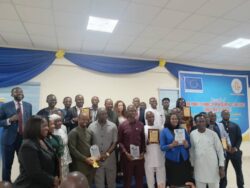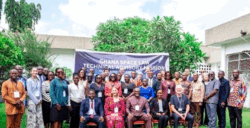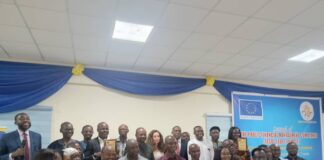As former children ourselves, we all are fully aware of this phenomenon called ‘comparisons’. The world around us all have come to us at various points in our lives, clothed in their fair share of comparisons—be it in those instances where we are the ones at whom extolling fingers are pointed, as archetypes to be looked at for replication, or those circumstances where others are pointed out to us, by parents or guardians, as examples requiring of us, replications… we each all are, one way or the other, quite familiar with the excruciating process of ‘comparisons’. As internet-confirmed humans, we are also fully aware of the fact that this phenomenon still persists, from childhood all the way to adulthood—that this phenomenon did not end with childhood. [‘internet-confirmed humans’ is an ‘are you a robot’ joke by the way.]
You know what, I think comparisons may be as natural to life as the very ecosystem surrounding us. But it makes sense, does it not? Because, truly, none of us are islands; our lives are not lived in isolation. So then, it is expected that in committing this act of living, we would do so, either on our own accord or on other’s recommendations, cognisant of the world around us—the people around us. So then, comparisons.
Nationhood, being personhood with a turf and flag… nations, being themselves persons (but on a much larger scale), do not escape this phenomenon of comparisons. That is why as citizens, when combing through our history and present in an attempt to critique our national journeys, we find ourselves doing so, inescapably, with other nations at the corners of our eyes, as gauge. Our determinations of our performances, at the end of the day, depend on how well we measure against the rest. Are we doing better, same, or worse? We ask ourselves.
Mostly we undertake this journey of critiquing, adopting the impetuous parent approach, incognisant (or choosing to be incognisant) of the differences that exist between our histories, realities, journeys—ours and other nations’, that is. We act like that parent who commits such comparisons upon their wards without taking into consideration the fact that perhaps, (just maybe) those other wards to whom they point as examples may be blessed with more enabling grounds—either so blessed with these fertile soils by their parents, or by nature itself.
Take the example of the child who grew up never needing to receive a direction from her parents to read, never having to receive a scold forcing them into loving learning, their parents never having to whip out a cane every time they whipped out their terminal reports… Imagine such a girl or boy, growing up seeing their father, in the night and at dawn, seated by his reading desk, reading away—without an academic examination in sight—just reading… Imagine such a child now grown, would it be at all surprising to find her adult-self perched on a writing desk every Saturday or Monday evening, writing away one-and-a-half pages worth of articles? Each week, reading and writing, spewing away pages upon pages every chance she gets, with no exam in sight… Now, imagine this hypothetical person of ours having friends whose parents berate them with the incessant ‘why can’t you be like her?, ‘why can’t you learn from that boy’ speeches… What would you say to these parents—these parents who point to this hypothetical lady and gentleman of ours in encouragement of (or sometimes in outright belittling of) their wards, insisting upon them replications? ‘Experiences, histories, and realities differ’.
I must say, this is not to suggest that this is some sort of unshakable golden rule of life—that our children are in the end what they see in us; that they, without having to try too hard, almost always end up replicating what we do and who we are. Even though this, for the most part, is a fact of life—it is yet still one which has within its pot of case studies, the occasional tangents. Sometimes children end up being and doing things that parents have never conceived of. But it is telling though, isn’t it? Haven’t you realised how quicker children are to do what you do than to do what you say? But we digress..
You have already surmised from your very first glance at this page that this is a very short article—relatively short, that is. Today’s piece is uncharacteristically short because…well, because it is more of an emotionally-charged blabber than a forethought intellectual dissection. And I believe that if a person is to allow their emotion to rule over their intellects, they must be brief about it. So on this matter of ‘nationhood’ and ‘comparisons’, we will treat this piece as a very brief emotional intro into the pieces to come.
A Journey In Comparisons And A Dissection Into Our Realities
In the past weeks, we have looked at the Ghanaian ‘political reality’ using the French journey as case study—not only France, but nations like the United States of America and Britain too. And those were the ‘Never Say Coup’ series. Weeks before that, we looked at the Ghanaian ‘legal reality’ using nations like Britain, USA, and Canada. And that was, yours truly, the ‘Acrobatics in Law’ and ‘Mischief in Law’ pieces. We have found ourselves brought up against China, USA, and Britain when dissecting our ‘academic reality’, with emphasis on the utilisation of our institutions of higher learnings as engines for national growth in articles like ‘Higher Learning, Low Expectations’.
Looking at the nation’s ‘housing reality’, we have used countries like Singapore as earnest yardsticks—in a series comprising differently titled articles: ‘The Son of Man and the Concept of the Abode’, ‘Pigs in Skyscrapers’, ‘White Elephants in Black Hands’, ‘White Umbrellas in Black Hands’, and ‘Closing Down on Housing’. When looking at our very ‘physical reality’ as persons coming together to collectively form a nation and a race, we did so by taking a delve into our perceptions of self—quite literally the physical bodies in which we walk about this earth. And that was the articles ‘This is not About Football’, ‘Time Thou Art God!, and ‘Before We Proceed, a Reconciliation’—here our comparisons were more along racial lines than they were national borders.
The list goes on. In fact, if you’ll bear me witness, almost each and every piece we have worked on here in this column have been so done through a comparative lens—one way or the other, we ‘pulled a parent’. In those pieces we almost always drew comparisons between our ward (Ghana) and other children (the rest of the world). Most of these comparisons we have so drawn with the West. Because it is with the West that we find in ourselves our own worst culprits—everywhere you go, the Ghanaian is citing USA, Britain (and pretty much the rest of Europe), etc. as yardsticks, not only demanding replications, but intending to cause in our own selves, shame—’look at how poorly we are doing as a nation’. Pointing to these nations, we snide ‘shame on you Ghana!’
Self-critiquing or parental-critiquing—whichever way we like to view our individual dynamic with our country—is a mighty tough job to do. Because in critiquing, one must do so with a clear aim—to uplift or downgrade. We each cannot help admitting to the fact that in as much as our ultimate wish is for an uplifted Ghana, a Ghana which is on an endless journey of self-betterment, we find ourselves, being frustrated parents (i.e. citizens) as we are, sometimes saying words, holding thoughts in our minds (perceptions of self) that lean more towards the ‘downgrading’ than it does the ‘uplifting’.
And in one of our very first articles in this column, an article titled ‘Genesis: The Basis Of All To Come’, we sounded a very necessary caution, providing a much-needed caveat even before this journey of ‘attempting prophecies’ was to begin. “I have always found my articles quite problematic. Whenever I cite Europe, USA, et al. as examples of this and that development imperative—I have always found these ‘citations’ problematic. Especially so, when done without a caveat…” This is how the article began. Of course, having raised a conundrum in its opening paragraph, the article rounded off with a solution. A solution that can be summed up in these very same words: experiences, histories, and realities differ. Actually, the conclusion was more nuanced than these summed up words, but I believe you know the drill. Kindly refer back to that piece if you are still at the point of a conundrum.
Heroes Born, Heroes Made, And Heroes Forged
But I must say, after the ‘Never Say Coup’ pieces, I couldn’t hold off writing this article any longer. Because I don’t know if you have noticed, but with these incessant comparisons, these nations on the receiving end of the lauding finger-pointing are bound to grow heads as big as… well, the landmass of Russia. The Americans, the Brits, etc., their heads, they must be ‘this’ big.
We would be remiss if we failed to add that these nations, they set about their national journeys with some sort of unspoken intent of attaining this coveted positions of yardsticks. We can say for certain that a country like America sure did. They had these aspirations in their national manifestoes—unspoken, unwritten, but there, nonetheless. Because this nation, it had an entire subcontinent to prove wrong, you know. Leaving their respective homes in Britain, Scotland, France, Germany, etc., severing ties with their home-nations to form the new nation of USA, the American had an entire subcontinent on their hands to prove wrong. So, heightened heroism, an inflated sense of self-worth, embellishment of histories, promotion of leaders into positions of gods, goddesses, sainthood, etc., those were recipes artificially forged by the American as self-encouragement, to meet the arduous task of building a great nation.
It is the ink and paint with which they wrote and painted their histories. In the article ‘Kurt And Cat: On The Art Of Rebranding’ we wrote, “The White folk… they write and wipe history as they please…” And that is a fact. Knowing that the very consciousness of their citizenries, their sense of self-worth, are much needed ingredients towards ensuring national development and advancement, the White folk, has since modern history began, taking to the art of writing, wiping, and tweaking history as they please—towards this end of boosting their sense of self-worth.
So, Christopher Columbus takes sail on to a land already filled with inhabitants, he commits gory acts of genocides upon these inhabitants in conquests of these lands, history is re-written to paint a picture of an explorer Columbus, a brave Columbus who stumbles upon a barren land—devoid of people, and—how do they even put it—in so doing ‘discovers America’. And just like that this man made of flesh and blood is no longer man, but a god.
We must note, however, that this full-on ascension of human into god, is not done solely for the benefit of that human. In uplifting Christopher Columbus into the status of deity, the American was uplifting their own selves. Fraudulent, true. This misguided godly conception of self is indeed fraudulent. But ‘fake it till you make it’, that seems to be the underlying philosophy here.
The Philosophy Of ‘Fake It Till You Make It’
Yes, it was the ‘Never Say Coup’ articles with their dissection of French history with coup d’états that called for the early penning of this piece. Because I can almost picture that French man and woman, being far from home, in this country of ours, seeing those articles, and being nostalgic, missing home, delving right into them, hoping to be showered, as they usually are, with praises—in this particular case, praises of their heroic past. And heroic past, this great nation France has had its own fair share. But imagine their shock when we stripped this history bare of sensationalism and mysticism, and drew parallels between their journey and ours—our ‘puny’ Ghanaian, African journey, a journey so notoriously unembellished, ungarnished; a history so notoriously white-washed, with no paint of a majestic black in sight. Ghanaian history, African history, Black history, is infamously without pizzazz.
While White history is intentionally whitewashed to inspire in the White folk—present and future generations—awe and inspiration, Black history is intentionally penned from disadvantaged positions—largely written not by us. Black history, the Black toil is made, covertly and overtly, foil to the White legend. For there to be leaders, there have to be followers; for there to be masters, there have to be servants; for the legend to persist, there must persist still, the meek. So, these nations, realising that stories and histories are, in the end, really what we make them, choose legend over meekness. They tell their stories with a legendary oomph—in ink, they write them.
While we, being conditioned as we are to meekness, do so from these meek positions assigned us. That is why you have two nations, having at various points in their histories, coup d’états—their citizenries having little to no recourse but a forceful overthrow of governments… In one country this horrific history is painted as a necessary heroic turning point spurring a very heroic national journey, a journey that went on to inspire the rest of the world, and for the other nation, this gory past is smeared unto their present and future as indelible ink—an event indicative of their innate lowliness, their inability to self-rule (as we find ourselves commenting every now and then).
History is indeed unkind to ye who is without a persuasive ink.
Parental Hack
Years back, this friend of mine, he informs me, “My parents have been giving me a hard time!” Using me as yardstick, his parents had been giving him a mighty hard time with his academic performance. To lighten his burden and assuage his guilt, I give him this anecdote…I remind him of the fact that growing up with a studious father, this whole avid learning thing came naturally to me. As soon as this friend of mine heard this, he, all of a sudden, did not give a hoot about his own problems. Immediately, he was transported into the future, when he would have two or three children of his own… Immediately, he was a parent who paid thousands of Cedis worth of school fees, who received at the end of each term, an academic report… Immediately, he was that parent who had his ward before him, inquiring, “Why are you not performing in this subject and that subject.
Immediately he had an idea, “Oh! then when I have kids, I am going to start staying up late into the night by a desk and pretend to be reading…And woe betide those kids if they come to me with a bad terminal report!” ,
Ladies and gentlemen, what we have on our hands is a classic case of ‘fake it till you make it’, no? Well, in this case, it is more of ‘fake it until your child makes it’. I wish this friend of mine all the best of luck with this strategy. And to all of us who plan on replication—good luck!
Afterall, if countries like the great nations of the West can do it, then each and every one of us, in the little confines of our homes, can do it too.










